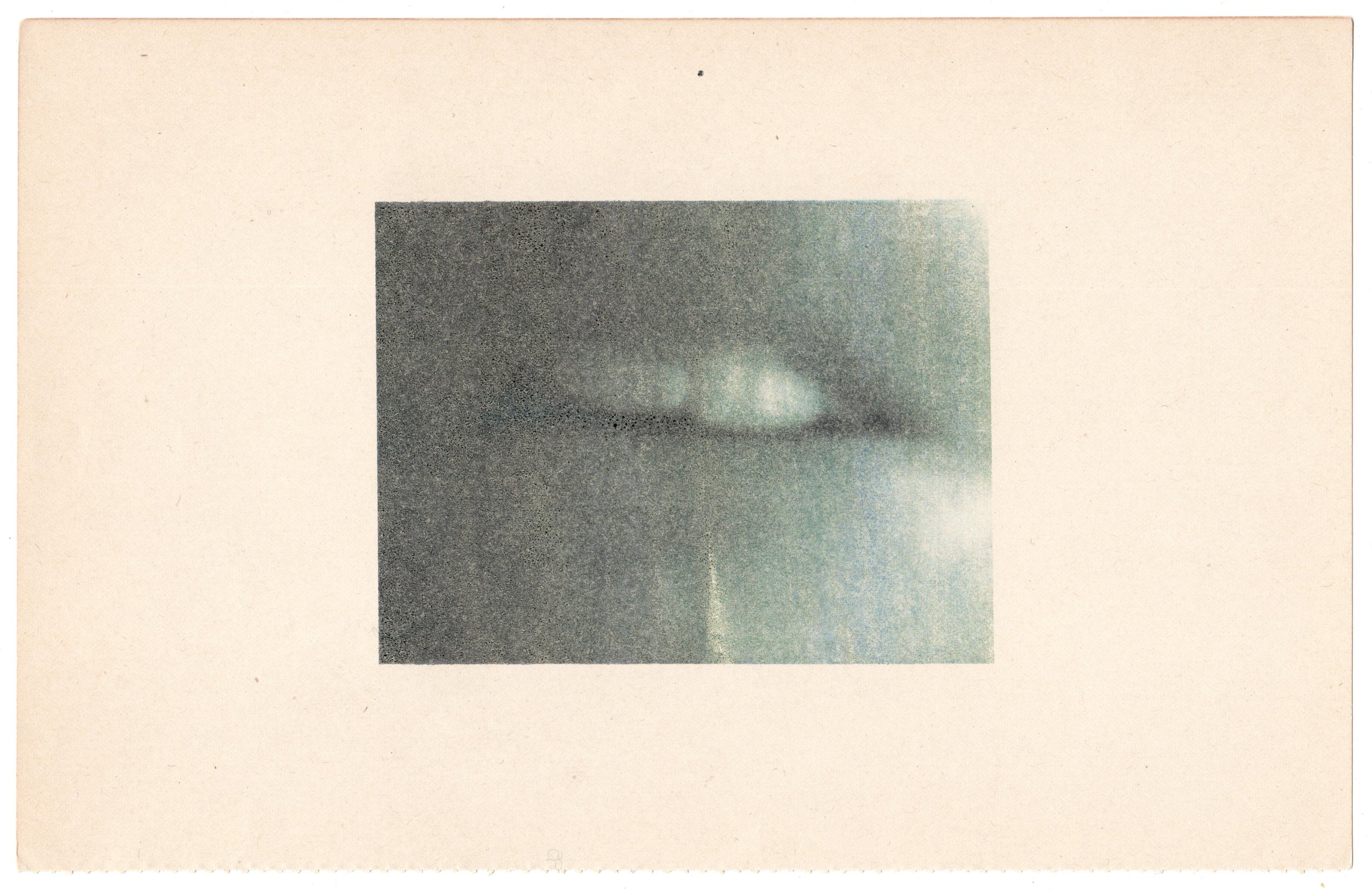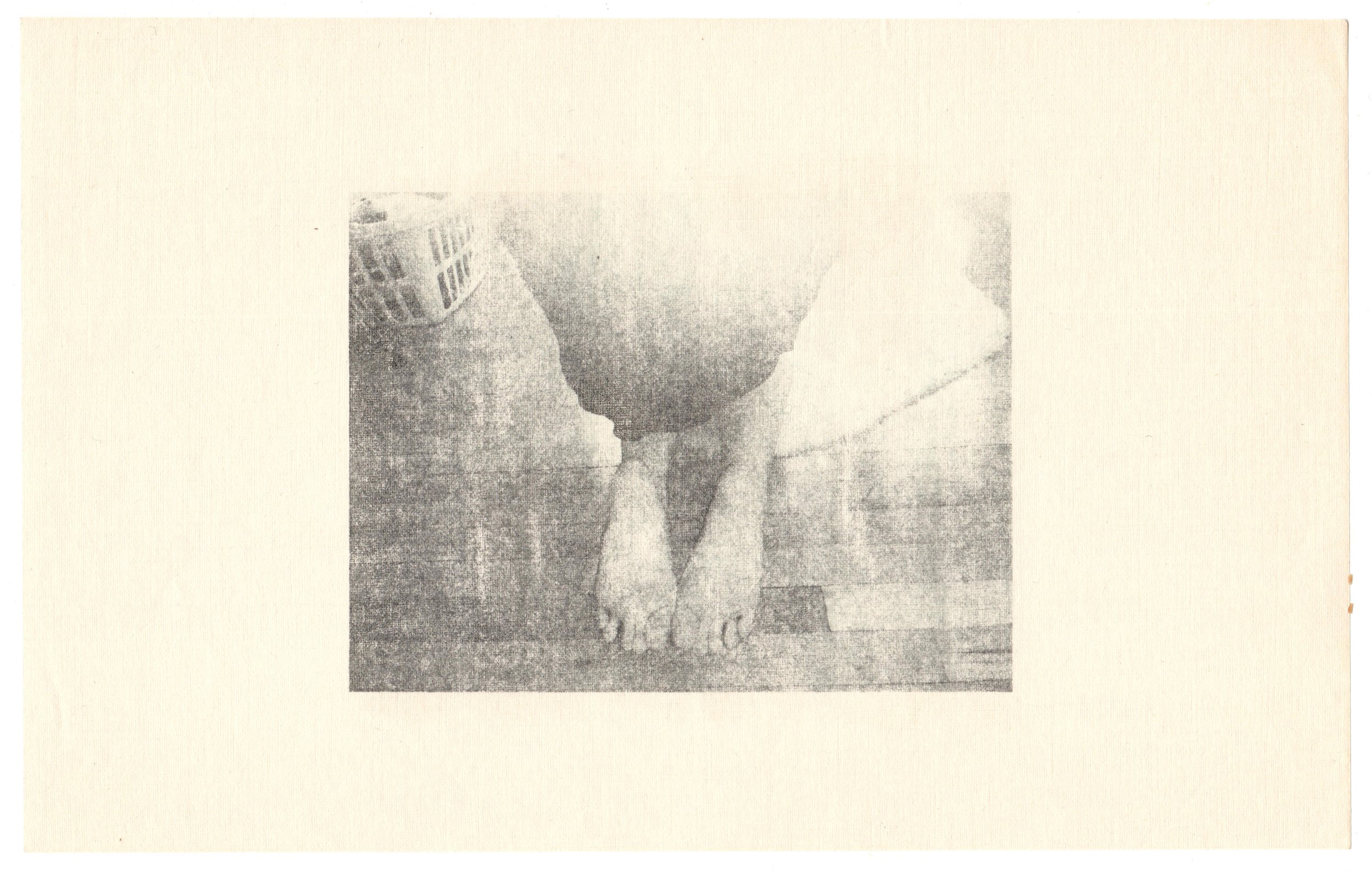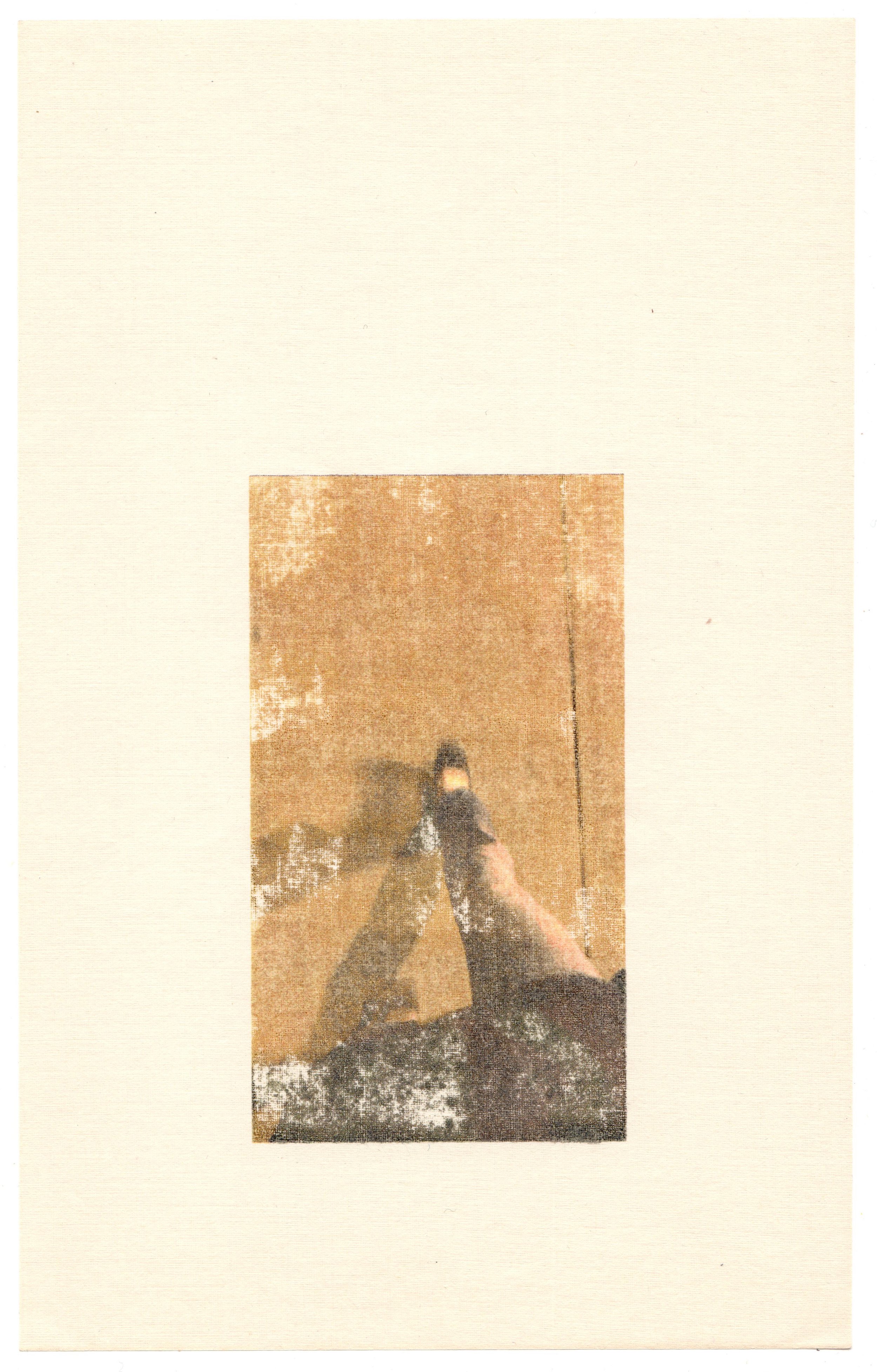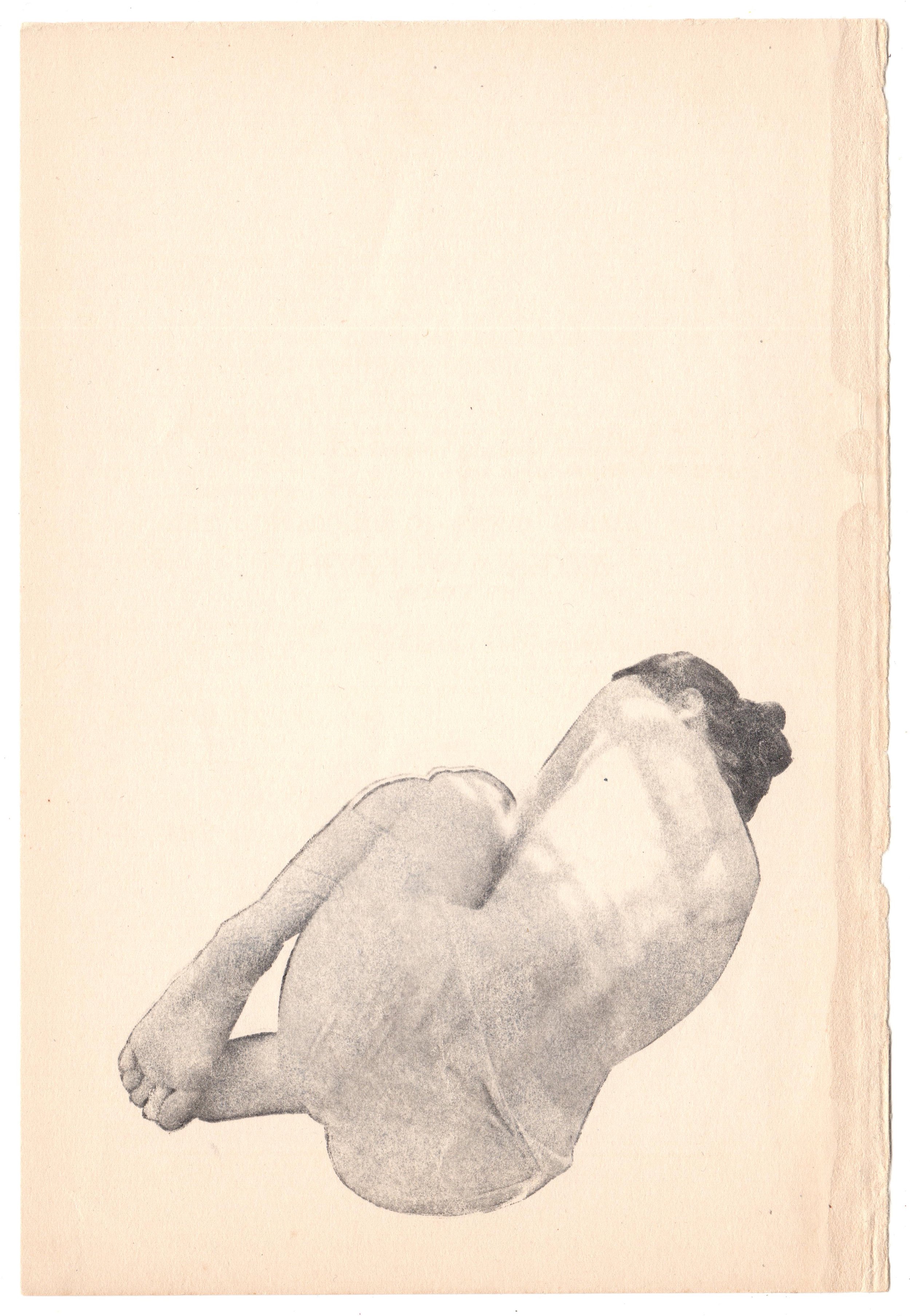Artist statement
I was born with a nuchal cord—the corporeal link between my mother and me, wrapped around my neck twice—threatening to suffocate me during delivery. When I was sixteen, my interest in my family history grew, and I began asking questions about my grandmother, Terry, whom I never met. That is when I learned about Terry's untimely passing by the intentional hand of another.
The realization that my first waking moments echoed that of my grandmother’s final moments ultimately led me to explore the themes of oppression and the silencing of women. I counteract this aspect of my identity while also examining what womanhood means to me.
The Now series examines my family history, the women in my life, and womanhood. Using my iPhone, old book pages, and a xerographic transfer process, I work in a diary-like format, finding the moments that make me pause and remind me of my place in the world.
Biography
Born in Norwalk Connecticut, grew up in Watertown MA
Roma Bartel has been exposed to art from a young age, being that many of her family members are artists. She attended Cambridge School of Weston. There she was able to strengthen her knowledge and language around art, and explore different mediums. She showcased her art in many student exhibitions, winning honorable mentions and a gold key in the Scholastic Art Awards. She was awarded the Trifiro/Capobianco Foundation College Scholarship. She went on to study at Massachusetts College of Art and Design where she began her studies in Studio for Interrelated Media. There she gained skills in filmmaking and soundwork. She later transferred to photography as she realized it was a better medium to express her ideas. Roma’s current focus in photography is in diaristic work relating to her experiences as a woman, and her family's lineage.
Interview
Olive - I think you seem to be exploring this question currently, but I’m curious about how your thinking might have developed regarding it. In your statement you mention how not all your images appear “feminine,” but have to do with it as an experience. So how are you thinking about defining femininity for yourself, and how do you capture such a thing?
Roma - I think a lot of the photos I take are photos that I take throughout my day, and kind of in a diary style. They are moments that have evoked that feeling for me, or reminded me of my identity, reminded me of a feeling that brings me back to that. It's weird, cause it's not as if they're always so specific. They could be very vague, but I think most people can relate to that, something will remind them of something, and they won't really know why.
Olive - I’m curious about your process, you mentioned using the paper from old book-end pages and a transfer pen, what does that mean for your project, and how do you transcribe this “world” of yours?
Roma - I really like the word transfer, because I get to take my worlds and put them where I want; I get to put my memories where I think they belong. I enjoy the control in which the whole image doesn't have to be shown, or getting to pick what part of the image to show. The old paper allows me to play with ideas of history and lineage.
Olive - Yeah I noticed that when you were talking about your definition of femininity, that you were referring to it as things that help you call back to something, as if you're thinking about this definition of femininity in a historical sense; recapturing something from the past.
Roma - yes, history in a broad sense, of all women and people in general, but I think everyone can devote these feelings. I’m also thinking about the women in my family, the women who came before me, and I really look up to them.
Olive - How do the Iphone pictures come into play? I’m wondering what kind of role such a tool has within your concept, and how it changes the way you work.
Roma - I think it started out as a question about if I wanted to make a statement on growing up in a digital world. You can't really take photos with an iphone without commenting on that, I guess. For me, it was more like it was such an instant thing, it was a camera that was always with me. I was thinking a lot about growing up in the digital world as a girl, or just a person, and how that’s bound to have affected me and so many people in unknowable, and knowable, ways.
Olive - I loved reading about the motifs that represent your grandmother, I’m curious if manifestations like this appear for that illusive definition of femininity as well. Are there visual symbols consistent with images that feel feminine to you? Especially if said images are not obviously so?
Roma - Definitely. I think everyone has those stereotypical expectations for what they’ll see. There's a photo I have of a reflection on the wall of some lace trim, just seeing the delicate outline of the shadow, and how a shadow moves. I placed that photo next to a photo of this red balloon that was holding up this huge pole – for scaffolding on the street – and there's a little balloon underneath it. It wasn't holding it up, but it looked like it was, and I think both those images together evoked that feeling for me.
Olive - Is this project your search for that definition of your feminine identity, or your way of expressing what had already been found?
Roma - I think it can be both. I do a lot of going back and looking at photos from certain times of my life. I use those photos a lot, so I think it is about going back and looking and seeing what's already happened. Those things create new things, looking back at old, creates new. And the more I learn about my past, in my daily life those things start to pop up and become clearer, so I think both.
Olive - Have you talked to those influential family members about this project? If so, how have those dialogues impacted the work?
Roma - I haven't really, I talk to my parents a little bit. My mom's a painter and my dad is a collage artist, they have been helpful in many ways throughout this project, but when it gets to the personal subjects, I tackle those on my own. I like this question, though. My family members are such a big part of the work, even though I didn’t involve them in conversation around the work. Maybe one day.
Olive - If you’re comfortable answering, do you have any hopes for what those conversations would end up being?
Roma - If I ever spoke to my grandma Yefkin about it… hmm. She is turning 100 in a few weeks. She's experienced so much, seen so much. I would love to connect with her over this. She is a sculptor, much of her work is sculptures of our family members, or work relating to our Armenian heritage. I think she would be able to relate to the subject matter of my project. I would love to connect with her. A lot of my work I've made in my life so far has been about my dad's mom. When I was 16 my dad took me out to dinner and decided I was old enough to learn about her murder. Making pictures and writing are my conversations and way of connecting with her. I can't actually talk to her, so, I don't know, I kind of feel like she's with me all the time. All the photos I take, everything I do is like a conversation with her, because she's always there.
Olive - Are there ways that the anger you mention from Ursula Le Guin’s “About Anger” show up in your work?
Roma - Definitely, maybe that won’t be clear to the viewer though. I remember when I first read that essay, my brother sent it to me when he knew I needed to read it. I related to it so much, and it made so many things click for me that I wasn’t able to articulate for myself. About what it means to hold in anger and turn it inwards towards yourself, especially as a young woman coming out of an abusive relationship, I had a lot of anger.
Olive - What are your thoughts on installing this work?
Roma - Nothing extravagant. I might bring some archive photos of my family members. Maybe a vase of flowers.
Olive - Are image pairings particularly important for how certain images are defined to a viewer?
Roma - Yes definitely, I want my images to be read almost like a diary. I think a lot of my photos need the aid of words. I have stories to go along with the images.











